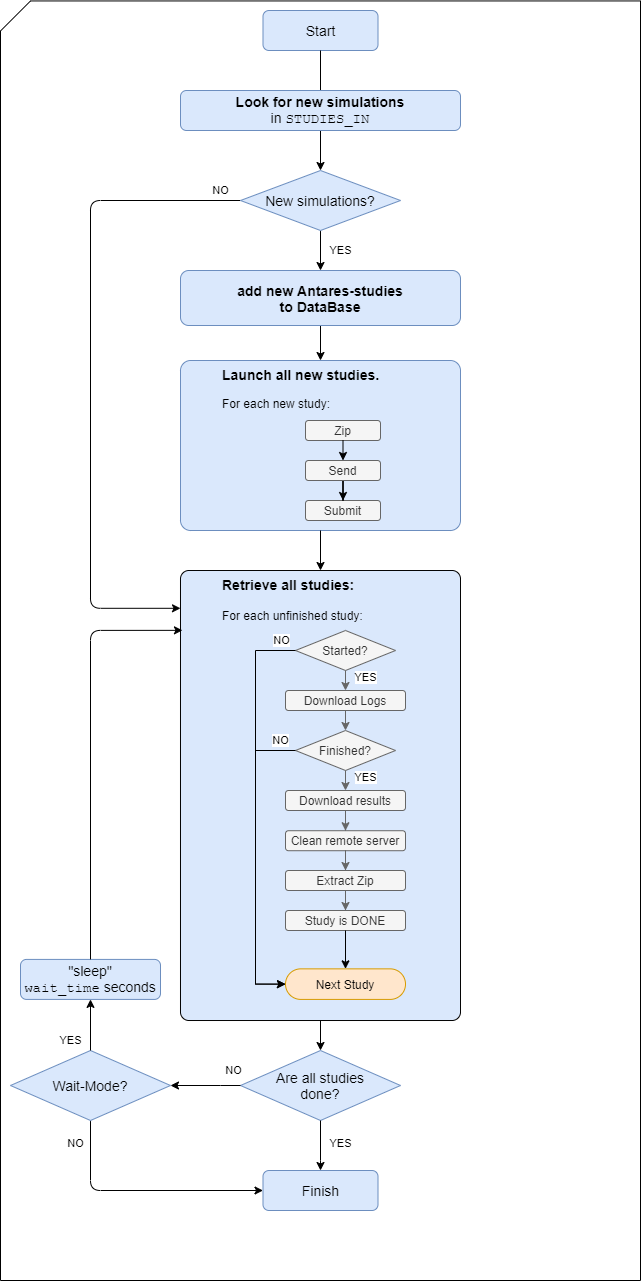# Antares Launcher
This program is intended to allow the user to send a list of Antares simulations to
a remote Linux machine that can run them using *SLURM Workload Manager*.
Currently, this program:
- Is configured to work with Antares studies from version 7.0 through 8.5
(the configuration can be changed in a YAML file).
- needs a remote UNIX server that uses *SLURM Workload Manager*.
The main workflow diagram is as follows:

## Requirements
See [`setup.py`](https://github.com/AntaresSimulatorTeam/antares-launcher/blob/main/setup.py)
Minimum version : python 3.8
### Main Python libraries
The following libraries are required to run the application in a production (or staging) environment:
- paramiko
- PyYAML
- tinydb
- tqdm
To install this library on production, you can run:
```shell
pip install Antares-Launcher
```
### Development and Unit Testing
To start developing, you can clone the repository from GitHub and create a Python virtualenv:
```shell
cd ~/workspace/
git clone https://github.com/AntaresSimulatorTeam/antares-launcher.git
cd ~/workspace/antares-launcher/
python3 -m venv venv
source venv/bin/activate
```
To run the unit tests, you need to install:
- pytest
- pytest-cov
- pytest-xdist
To install this library in development mode for testing, you can run:
```shell
pip install -e .[test]
```
Additional dependencies could also be used for development, for instance:
- black
- check-manifest
- isort
- mypy
### Documentation
In this project, we use Sphinx to generate the documentation.
Extra requirements are:
- m2r
- recommonmark
- sphinx
- sphinx_rtd_theme
## Installation
### Generation of the binary executable
In order to generate the binary file, execute the following command:
```
pyinstaller --additional-hooks-dir=antareslauncher/hooks/ -F antareslauncher/main_launcher.py -n Antares_Launcher
```
In order to generate the binary file of the light version of the launcher (reduced set of options), execute the
following command:
```
pyinstaller --additional-hooks-dir=antareslauncher/hooks/ -F antareslauncher/main_launcher_light.py -n Antares_Launcher_Light
```
The generated file will be inside the dist directory. Note that pyinstaller does not enable the cross-compilation: e
binary file generated on windows can only be expected with the windows OS
## Use Antares_Launcher
### Run Antares_Launcher
**Antares Launcher** can be used by running the executable file
By default, the program will:
- look for a configuration file necessary for the connection
named *ssh_config.json*.
If no value is given, it will look for it in default location with this order:
- 1st: current working directory
- 2nd: $HOME/antares_launcher_settings/ssh_config.json
- 3rd: default configuration (json file embedded in the data directory if present).
A default *ssh_config.json* file can be found in this
repository in the `./data` directory of the project
- look for an rsa-private ssh-key to access to the remote server.
The path of the key is specified in the `ssh_config.json` file
- look for a directory containing
the Antares studies to be run on the remote machine
named *STUDIES-IN*.
- put the results in the directory named
*FINISHED*
- create a directory *LOGS* that contains the logs of the programs
and several directories containing the three log files specific of each simulation.
Currently **antares_launcher** uses a specific configuration attached to the specific setting of
`data/launchAntares-${SCRIPT-VERSION}.sh`
#### Get the *how-to*
```
Antares_Launcher --help
```
will show how to use the program.
### SLURM script on the remote machine
In order to submit new jobs to the *SLURM* queue manager,
**Antares_Launcher** launches a bash-SLURM script the name of the script is set in `data/configuration.yaml`.
If Antares_Launcher fails to find this script
an exception will be raised and the execution will stop.
The specification of the script can be found in the class
`SlurmScriptFeatures` in the module `antareslauncher.slurm_script_features.py`.
See [Deploy Antares Launcher](#deploy-antares-launcher) for specific values.
## Useful commands
Since the addition of the Makefile to the project, one can now easily set a virtual environment, install requirements,
generate binary file, run tests, generate the doc and deploy it...
At the root of the directory, all the available commands can be seen with typing: make

If for example, you would like to run the test, a simple ``make test`` will do the trick

## Useful commands
Run unit tests:
```shell
pytest -v tests/
```
Run unit tests with code coverage:
```shell
pytest --cov=antareslauncher --cov-report=term-missing --cov-report=html --cov-branch tests/
open htmlcov/index.html
```
# Deploy Antares Launcher
## Installation on the remote server
In order to be able to accept jobs from Antares_Launcher, the remote machine needs to be ready:
the binaries and script expected by **Antares_Launcher** need to be installed and
the required ssh-public-keys need to be added to the `authorizedkeys` file
of the account of the remote server.
### Things to do
- `launchAntares-${SCRIPT-VERSION}.sh` should be copied to the remove server
and ist path should be set in `data/configuration.yaml`
- Install the Antares solver binary `antares-x.x-solver` on the remote server.
set its installation path in `launchAntares-${SCRIPT-VERSION}.sh`
- The R Xpansion script, `data/XpansionArgsRun.R`,
has to be copied to the remote server and
its path should be set in `launchAntares-${SCRIPT-VERSION}.sh`.
#### Important notice
The users currently copy the executable every time they need to use it.
This is not practical, an alternative should be developed.
## Installation of R packages on the remote server
In order to correctly install or update packages to be used on the remote server
the *R*repositories and installation-destination need to be set.
The `launchAntares-${SCRIPT-VERSION}.sh` set the variable where the *R*libraries are installed runtime,
no need to create a `.Renviron` file.




